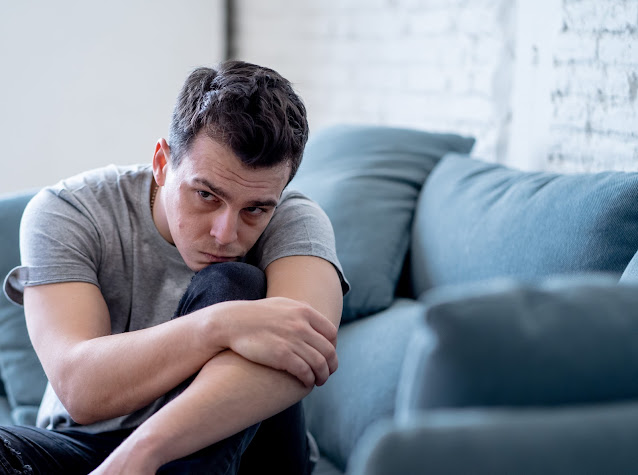The Connection Between Depression and Anxiety
Anxiety
and sadness are more closely related than you may imagine, despite the fact
that anxiety is typically thought of as a high-energy condition and depression
as a low-energy state. A depressed individual frequently has a great deal of
anxiety, possibly even to the point of experiencing panic attacks.
More than just trepidation and worry are involved in anxiety disorders. They have the power to instill horrifying fear over topics that other people wouldn't give a second thought. Many persons who suffer from anxiety disorders are completely aware that their ideas are unreasonable. They still can't stop them, though. They are plagued by feelings of inner tumult. An entry point for depression is this angst
Why Do Anxiety and Depression Frequently Occur Together?
According
to Sally R. Connolly, LCSW and therapist, "It's a circle." "When
you feel nervous, you frequently find yourself thinking about a concern or an
issue. It makes you feel horrible. You then believe that you have failed. You
start to feel depressed.
The
relationship between anxiety and depression is complex:
•
People who already have an anxiety condition have a substantially higher risk
of developing depression.
•
People who are depressed frequently experience anxiety and worry. Nearly half
of those who have significant depression also experience severe and persistent
anxiety. Anxiety frequently comes before depression, and PTSD sufferers are
particularly susceptible to developing depression. A biological predisposition
for both of these disorders is frequently at the heart of an individual's
struggle. One can easily trigger the other. More so than with depression, this
seems to apply to anxiety disorders. "Some folks are just worriers and
pass it down," says Connolly.
A
psychiatrist, therapist, or other healthcare professional should be seen by
anyone who has symptoms of an anxiety condition to discuss these symptoms.
Never put off getting treatment for an anxiety illness. Depression may find a
person's door wide open if it is not detected in time, and it may then go in
and take up residence in that person.
What
Motivates Anxiety?
The
fight-or-flight region in these people's brains activates even in the absence
of a genuine threat for reasons that are currently only partially understood.
It's like having an invisible predator follow you around all the time when
you're constantly anxious. There is always a constant sense of risk. They
remain alert at all times.
Anxiety
attacks do happen from time to time. People frequently experience anxiety when
there is tension in a romantic relationship, a challenge at work, a looming test,
or a significant decision. However, anxiety disorders go beyond brief moments
of fear or worry. For those who suffer from an anxiety condition, the anxiety
persists. Over time, it frequently worsens to the point that feelings start to
come in the way of their normal everyday activities.
Why
Do People Get Depressed?
According
to recent studies, a mix of genetic, biochemical, environmental, and
psychological variables contribute to depression. Although it can happen at any
age, it frequently starts in maturity. Depression in children and teenagers may
manifest as irritation rather than poor mood, similar to many anxiety
disorders.
Depression
manifests as hopelessness, despair, and wrath by adulthood. Low energy levels
make those who suffer from them frequently feel as though they cannot handle
life's essential daily responsibilities and interpersonal relationships.
What Treatment Methods Are Commonly Employed for this Dual
Diagnosis?
Evidence-based
research advises treating anxiety and depression together.
These
efficient methods for treating these co-occurring diseases include:
Treatment
for these diseases frequently involves Cognitive Behavioral Therapy (CBT). It
is possible to address fears, anxieties, and propensities toward depression by
identifying their underlying causes. Patients discover their hidden issues and
learn how to take charge of their emotions and lives.
•
Antidepressant drugs - These are often administered in conjunction with CBT to
treat both conditions. The new antidepressant medications known as selective
serotonin reuptake inhibitors (SSRIs) have fewer side effects than their
predecessors.
• Exercise
is particularly beneficial for both illnesses. The body releases feel-good
hormones as a result of physical exertion. This promotes tranquility and a
sense of wellbeing.
•
Relaxation techniques - This frequently incorporate mindfulness or meditation.
These methods frequently assist in treating illnesses and enhancing quality of
life.
For More Information just Click the Links below:
https://hire.careerbliss.com/company/trust-mental-health/
https://www.pcdh19info.org/profile/trustmentalhealth/profile
https://bunbly.tribe.so/user/trust_mental_health
https://www.baconsalt.com/profile/trustmentalhealth/profile
https://www.richardgerver.com/profile/trustmentalhealth/profile
https://www.monsterlabo.com/profile/trustmentalhealth/profile
https://www.aapf.org/profile/trustmentalhealth/profile
https://www.magcloud.com/user/trustmentalhealth
https://github.com/StressTherapy
https://www.ted.com/profiles/38165268/about
https://www.beagleweekly.com.au/profile/trustmentalhealth/profile
https://lifeinsys.com/user/trustmentalhealth
https://vimeo.com/user184599059
https://dribbble.com/Trustmentalhealth/about
https://www.lakazmaman.com/profile/trustmentalhealth/profile
https://www.boudavobrimdole.cz/profile/trustmentalhealth/profile?lang=en
https://www.dessertd.com/profile/trustmentalhealth/profile
https://slides.com/trustmentalhealth
https://www.universe.com/users/trust-mental-health-VN78SB
https://infogram.com/app/#/library
https://medium.com/@trustmentalhealthTMH
https://www.formuler.tv/profile/trustmentalhealth/profile
https://www.brainforest.org/profile/trustmentalhealth/profile
https://www.zktecousa.com/profile/trustmentalhealth/profile
https://www.martinwongphoto.com/profile/trustmentalhealth/profile
https://www.brandonmarcellophd.com/profile/trustmentalhealth/profile
https://www.110above.com/profile/trustmentalhealth/profile
https://www.classiccitynews.com/profile/trustmentalhealth/profile
https://www.cherrycrestfarm.com/profile/trustmentalhealth/profile
https://www.agileventures.org/users/trust-mental-health
https://www.qcca.org.uk/profile/trustmentalhealth/profile
https://pyrotalks.tribe.so/user/trust_mental_health
https://www.plano.heartplace.com/profile/trustmentalhealth/profile
https://forum.repetier.com/profile/TrustMentalHealth
https://write.as/luv15ti0ko7wn.md
https://my.olympus-consumer.com/members/trustmentalhealth
https://www.patreon.com/Trustmentalhealth?fan_landing=true&view_as=public
https://www.castingcall.club/trustmentalhealth
https://westseattleblog.com/forums-2/users/trustmentalhealth/
https://forums.soompi.com/profile/1516783-trust-mental-health/?tab=field_core_pfield_11
https://www.zintro.com/profile/zib2afca83?showpublic=true&ref=
https://www.anime-planet.com/users/TrustMentalHealth
https://www.wpanet.org/profile/anxietytherapy/profile
https://hackmd.io/@TrustMentalHealth/Hyq9mii-i
https://padlet.com/TrustMentalHealth/bglcarrc3e45zhyq
https://learn.acloud.guru/profile/trust-mental-health




Comments
Post a Comment